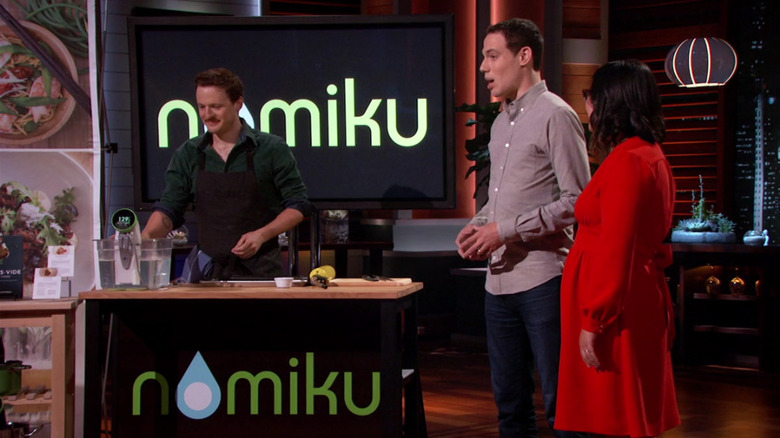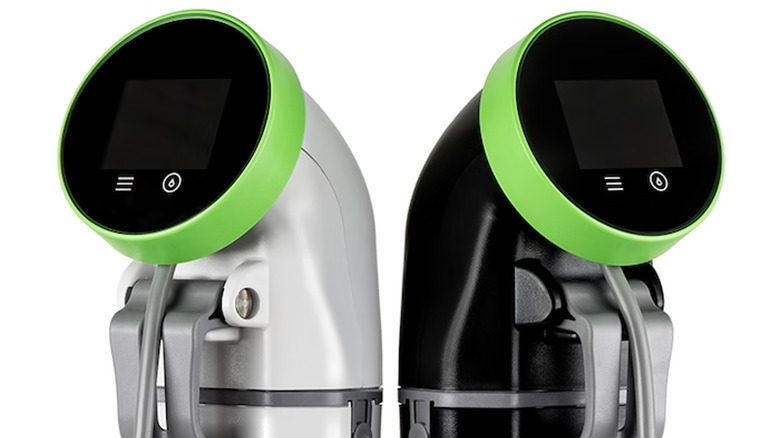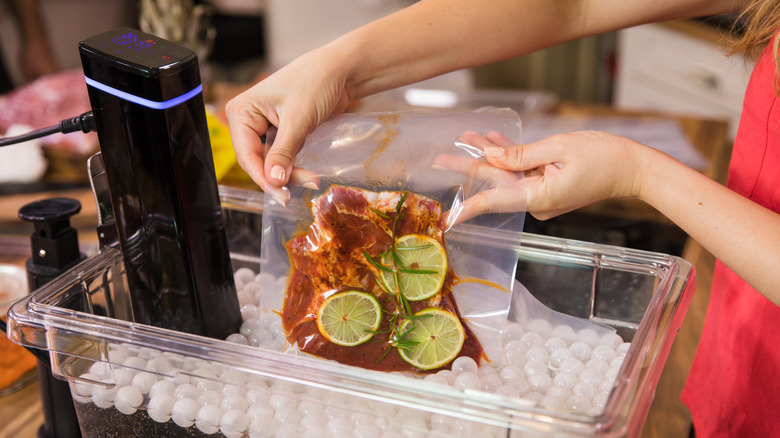Where Is Nomiku From Shark Tank Today?
Cooking food is pretty simple. Cooking it perfectly every time is really hard. It's why we enjoy the skill and predictable quality of our favorite restaurants. They can cook a steak how we like it, consistently. One trick restaurants use to be so precise is sous vide.
This cooking technique means "under vacuum" and became popular in commercial cooking in the 1970s. Food is sealed into heavy-duty bags, and cooked by being submerged in water set to an exact temperature. If you want a steak cooked to 120 degrees Fahrenheit, set the heat source and pump, called an immersion circulator, to that temperature and let it sit for the prescribed time. It can be minutes, but it can also be hours. Those temperatures are precise, but not high enough to develop any color. So, the final step is often a sear over very high heat to develop a golden-brown crust.
By 2009, sous vide immersion circulators were making inroads into home kitchens. Those early at-home adopters paved the way for what's become almost a billion-dollar annual industry.
One of the hurdles sous vide-style cooking has to overcome is that it sounds complex, and seems complicated. Part of that might be an unfamiliar French pronunciation. Or, thinking that it requires an app, and some complex understanding of thermodynamics. Maybe it's an assumption that you need a vacuum sealer. None of that is true. In fact, you can craft a makeshift sous vide out of your old beer cooler.
Nomiku dives into the Shark Tank
Abe and Lisa Fetterman's "Shark Tank" pitch was their version of an immersion circulator, called Nomiku. They hoped to compete for a part of the burgeoning sous vide market. Since entering home kitchens, sous vide has gained a wider audience. As the Fettermans point out, the water bath is more than just precise, it can also be really convenient. The food can be cooked, and then held for a long time. That large window means an immersion circulator might be just as much of a slow cooker as something newfangled and complex.
The Fettermans had an impressive sales history in the few years Nomiku had been around. Two highly successful Kickstarter campaigns resulted in Nomiku's development and some pending deals with retailers. The Fettermans' financial backing, at that point, was tenuous, and they were worried about losing their majority control of the business if they didn't grow quickly.
The financial implications of these various funding sources aren't common to most of us. Jeremy Alexander's YouTube breakdown of Nomiku's funding dilemma does a great job of summing it all up.
In the end, most of the Sharks couldn't get past a troubling valuation, lower-than-expected sales, and uncertain ownership concerns. There was one exception, Chris Sacca, whose $250,000 deal was contingent on the Fettermans raising additional capital from other investors.
No more Nomiku
It's not clear if this deal came to fruition, or if it's one of the nearly 75% of "Shark Tank" deals that don't pan out as we see on the show, per Forbes. But, we do know that Nomiku "shuttered operations" in December of 2019. In a tweet explaining the closure, the company cites its inability to, "get to a place of sustainability to keep the business going."
Between airing, and Nomiku's closure, the brand had started to offer a subscription meal plan, called Nomiku Meals that paired with its circulators. That wasn't enough to fend off an onslaught of competition. For example, Williams-Sonoma, which offered the Nomiku, now sells other circulators (aka sous vide devices) from four other makers.
If you're intrigued by sous vide, Wirecutter reviewed those machines, plus six more. Many of the features Nomiku offered are offered by these models, including an app, wi-fi capabilities, and a simple, user-friendly, interface. Despite Nomiku's demise, there's no shortage of options to help you achieve the perfect sous vide steak.


